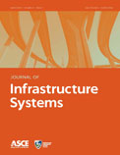
Journal of Infrastructure Systems
Scope & Guideline
Connecting Ideas for a Sustainable Infrastructure Tomorrow
Introduction
Aims and Scopes
- Infrastructure Resilience and Risk Management:
Research on strategies and methodologies to enhance the resilience of infrastructure systems against natural disasters, climate change, and other stressors. - Innovative Technologies in Infrastructure:
Exploration of cutting-edge technologies such as machine learning, AI, and IoT in monitoring, managing, and optimizing infrastructure performance. - Public-Private Partnerships (PPP) and Economics:
Analysis of PPP models, economic implications, and performance assessments of infrastructure projects, focusing on value for money and sustainability. - Environmental and Social Impacts of Infrastructure:
Studies examining the environmental sustainability and social equity implications of infrastructure development and management. - Data-Driven Decision Making:
Utilization of data analytics, simulation models, and decision support systems for effective infrastructure management and policy-making.
Trending and Emerging
- Integration of AI and Machine Learning:
An emerging focus on using artificial intelligence and machine learning techniques to improve infrastructure monitoring, predictive maintenance, and performance optimization. - Climate Change Adaptation Strategies:
Increasing attention on developing adaptive infrastructure solutions that enhance resilience against climate change impacts, particularly in vulnerable regions. - Community Engagement and Social Equity:
Growing emphasis on the role of community engagement in infrastructure decision-making processes and the pursuit of equitable outcomes in infrastructure planning. - Digital Twin Technologies:
A rising trend in utilizing digital twin technologies for real-time monitoring and management of infrastructure systems, allowing for better predictive analytics and maintenance. - Interdisciplinary Approaches to Infrastructure Challenges:
A trend towards interdisciplinary research that combines engineering, economics, social sciences, and environmental studies to address complex infrastructure issues.
Declining or Waning
- Traditional Infrastructure Asset Management:
Older methodologies and frameworks for asset management are being overshadowed by more innovative, data-driven, and integrated approaches. - Conventional Construction Practices:
Research focused solely on traditional construction methods is decreasing as there is a growing emphasis on sustainability, smart technologies, and resilience. - Static Risk Assessments:
Static models for risk assessment are declining in favor of dynamic, probabilistic approaches that better account for uncertainties and evolving conditions. - Single-Factor Analysis in Infrastructure Studies:
Research that considers only one aspect of infrastructure systems is waning as interdisciplinary approaches that consider multiple factors become more prevalent.
Similar Journals
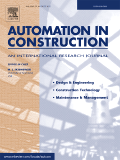
AUTOMATION IN CONSTRUCTION
Transforming the Future of Building Through AutomationAUTOMATION IN CONSTRUCTION is a premier academic journal published by Elsevier, dedicated to advancing the fields of Building and Construction, Civil and Structural Engineering, and Control and Systems Engineering. Since its inception in 1992, this journal has served as a vital platform for disseminating innovative research and practical applications in automation technologies within the construction industry. With a distinguished 2023 impact factor reflected in its Q1 ranking across multiple engineering categories—securing rank #3 in Civil and Structural Engineering and rank #3 in Building and Construction—AUTOMATION IN CONSTRUCTION stands out as a leading resource for researchers, professionals, and students keen on staying at the forefront of this rapidly evolving field. The journal offers access to cutting-edge studies that explore automation processes, methodologies, and tools, contributing to the enhancement of productivity and sustainability in construction practices. With contributions from global experts, each issue of AUTOMATION IN CONSTRUCTION provides comprehensive insights that help drive innovation and foster collaboration.

Civil Engineering Infrastructures Journal-CEIJ
Building bridges between research and practice in civil engineering.Civil Engineering Infrastructures Journal (CEIJ), published by the University of Tehran, College of Engineering, is a premier platform dedicated to advancing the field of civil and structural engineering. With an ISSN of 2322-2093 and an E-ISSN of 2423-6691, CEIJ has been an Open Access journal since 2013, ensuring that critical research is accessible to a global audience. While it currently holds a Q4 category ranking in Civil and Structural Engineering as per the 2023 quartiles, the journal is committed to enhancing its reputation and impact within the academic community. Researchers, professionals, and students will find valuable insights in its compelling articles, which cover a wide array of topics pertinent to civil engineering infrastructures. The journal aims to foster innovative ideas and solutions that address contemporary challenges in the industry. As a publication rooted in Iran but reaching an international readership, CEIJ serves as a significant conduit for disseminating impactful research in the ever-evolving landscape of civil engineering.

Electronic Journal of the Faculty of Civil Engineering Osijek-e-GFOS
Championing Open Knowledge for Global Civil Engineering CommunitiesWelcome to the Electronic Journal of the Faculty of Civil Engineering Osijek-e-GFOS, a prominent platform dedicated to the dissemination of innovative research in the field of civil engineering. Published by the University of Osijek, this Open Access journal has been accessible to the global academic community since 2010, facilitating the sharing of knowledge and advancements without financial barriers. With an E-ISSN of 1847-8948, the journal aims to cover a broad scope of civil engineering disciplines, including structural engineering, geotechnics, environmental engineering, and construction management, among others. It serves as a crucial resource for researchers, professionals, and students, providing them with insightful articles and studies that contribute to the development of best practices in the field. By promoting open collaboration and knowledge sharing, the Electronic Journal of the Faculty of Civil Engineering Osijek-e-GFOS stands as a testament to the commitment of the University of Osijek to enhance the field of civil engineering through impactful research and educational outreach.
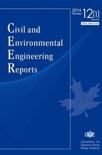
Civil and Environmental Engineering Reports
Advancing sustainable solutions in civil and environmental engineering.Civil and Environmental Engineering Reports is a prestigious open access journal published by UNIV ZIELONA GORA, dedicated to advancing research in the dynamic fields of civil and environmental engineering. With its ISSN 2080-5187 and E-ISSN 2450-8594, the journal aims to disseminate innovative studies, methodologies, and practical applications that address contemporary challenges in these disciplines. Since its establishment in 2014 as an open access platform, it has emerged as a vital resource for researchers, professionals, and students alike, enabling free access to high-quality research findings. Situated at Licealna 9, Zielona Góra 65-417, Poland, the journal strives to foster collaboration and knowledge exchange within the global engineering community, making it an essential reading for anyone invested in civil and environmental engineering advancements.
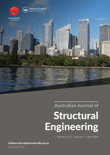
Australian Journal of Structural Engineering
Exploring the Frontiers of Engineering ExcellenceThe Australian Journal of Structural Engineering (ISSN: 1328-7982, E-ISSN: 2204-2261), published by TAYLOR & FRANCIS AS, serves as a pivotal platform for disseminating high-quality research in the fields of civil and structural engineering, mechanical engineering, and mechanics of materials. With a publications timeline from 2008 to 2024, this journal plays a crucial role in advancing knowledge and practice within its disciplines, boasting Q3 rankings across various categories as of 2023. Although it operates under a subscription model, the journal remains accessible to a diverse audience, including researchers, professionals, and students, seeking to enrich their understanding and engagement with contemporary engineering challenges. The Australian Journal of Structural Engineering is not only a repository of innovative ideas but also a vital resource for fostering collaboration and sparking discussion among scholars and practitioners striving for excellence in engineering design and analysis.
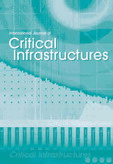
International Journal of Critical Infrastructures
Empowering interdisciplinary dialogue for sustainable systems.The International Journal of Critical Infrastructures, published by InderScience Enterprises Ltd, is a leading platform dedicated to advancing the interdisciplinary study and management of critical infrastructures across various sectors. With its ISSN 1475-3219 and E-ISSN 1741-8038, this journal plays a vital role in disseminating research that engages with the complexities of energy systems, environmental sustainability, and safety management. Operating from the United Kingdom, it has been an influential publication since its inception in 2004 and continues to provide accessible insights through its varied articles aimed at researchers, professionals, and students alike. Despite its Q4 ranking in the energy sector and Q3 in environmental science as of 2023, the journal's commitment to quality research and its diverse scope fosters a growing academic dialogue, contributing to the evolution of theories and practices in critical infrastructure management. In a world increasingly dependent on robust infrastructural systems, the International Journal of Critical Infrastructures is essential for anyone looking to stay at the forefront of this vital field.
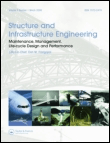
Structure and Infrastructure Engineering
Transforming Challenges into Engineering TriumphsStructure and Infrastructure Engineering, published by TAYLOR & FRANCIS LTD, is a premier academic journal that serves as a vital resource in the fields of engineering and construction. Featuring an ISSN of 1573-2479 and an E-ISSN of 1744-8980, this journal has established its reputation as a leader in disseminating high-quality research. Since its inception, it has successfully transitioned through converged years from 2007 to 2024, earning a prestigious position within the Q1 quartile across multiple engineering disciplines, including Building and Construction, Civil and Structural Engineering, and Ocean Engineering, among others. Its impact is underscored by impressive Scopus rankings, particularly its 5th rank in Ocean Engineering within the top 95th percentile. The journal’s commitment to advancing knowledge in safety, risk, reliability, and quality makes it an indispensable platform for researchers, professionals, and students aiming to stay at the forefront of engineering innovations. Access to its comprehensive articles allows for a deeper understanding of contemporary challenges and solutions in infrastructure development.
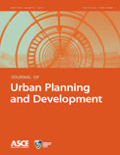
JOURNAL OF URBAN PLANNING AND DEVELOPMENT
Innovating Solutions for Sustainable Urban Development.The JOURNAL OF URBAN PLANNING AND DEVELOPMENT, published by the ASCE-AMER SOC CIVIL ENGINEERS, stands as a pivotal platform in the realms of urban studies, civil and structural engineering, and development. With an ISSN of 0733-9488 and E-ISSN of 1943-5444, this journal aims to disseminate high-quality research addressing critical urban planning challenges, fostering innovative solutions, and contributing to sustainable development practices. Spanning from its inception in 1979 to the anticipated issues up to 2024, the journal proudly occupies the Q2 category across multiple disciplines, including Civil and Structural Engineering, Development, Geography, Planning and Development, and Urban Studies. Its noteworthy Scopus rankings reflect its influence, notably being positioned in the 76th percentile in Urban Studies. With no open access options currently available, the journal remains a selective forum for scholarly discourse, attracting researchers, professionals, and students eager to engage with cutting-edge developments in urban planning and design.
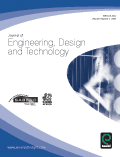
Journal of Engineering Design and Technology
Connecting Ideas and Innovations in EngineeringJournal of Engineering Design and Technology, published by Emerald Group Publishing Ltd, is a prominent platform in the field of engineering, specializing in design and technology innovations. With an ISSN of 1726-0531, this journal has made significant contributions to the body of knowledge since its inception in 2005, offering rigorous peer-reviewed articles that cover a diverse range of topics from conceptual design to advanced engineering practices. As a Q2 journal in Engineering (miscellaneous), it stands out in the Scopus Rankings with a commendable position at #44 out of 307 and an impressive 85th percentile, reflecting its substantial impact in the engineering community. While currently not categorized as Open Access, the journal continues to pursue accessibility and engagement for researchers, professionals, and students alike, ensuring that influential research is disseminated effectively. As it converges towards 2024, the Journal of Engineering Design and Technology remains an essential resource for those advancing the scope of engineering innovations and technology-driven solutions.
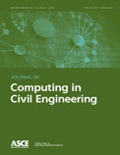
JOURNAL OF COMPUTING IN CIVIL ENGINEERING
Advancing the Future of Civil Engineering Through Computing.JOURNAL OF COMPUTING IN CIVIL ENGINEERING is a leading publication in the field of civil and structural engineering, with a specific focus on the application of computer science techniques in civil engineering projects. Published by the ASCE - American Society of Civil Engineers, this esteemed journal has been at the forefront of innovative research since its inception in 1987 and continues to maintain high academic standards with a remarkable impact factor. Achieving a prestigious Q1 ranking in both Civil and Structural Engineering and Computer Science Applications, it holds a commendable position within the top percentiles of Scopus ranks, at 94th and 91st respectively. The journal serves as a vital resource for researchers, practitioners, and students aiming to explore the integration of computational technologies and methodologies in civil engineering practices. By publishing cutting-edge research, it aims to advance knowledge and foster collaboration within the field, contributing significantly to the development of efficient, sustainable, and innovative engineering solutions.